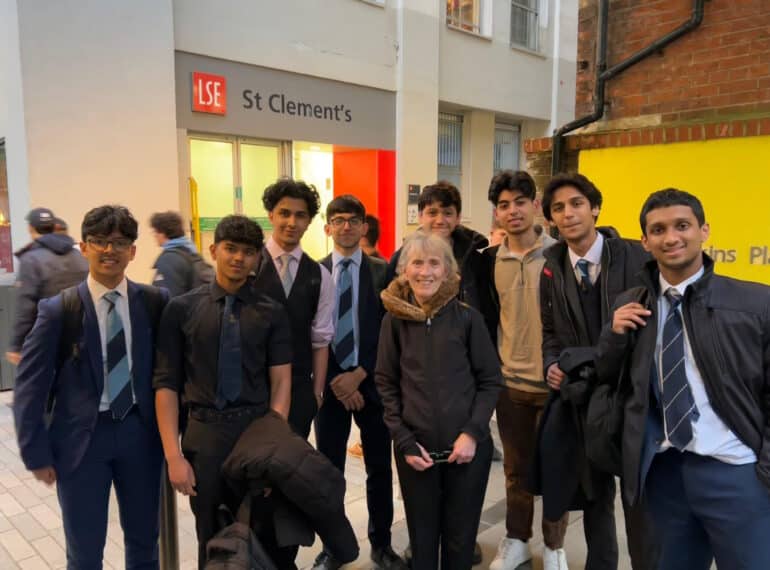Meeting a Nobel prizewinner

Year 12 economists seized the chance to meet Nobel laureate Claudia Goldin – only a short time after writing an essay about her work.
Hers was one of three lectures given by Nobel prize-winning economists at the LSE within the space of just one week. The sixth-formers attended of their own volition.
Economics teacher Celia Wallace said: “Claudia Goldin’s work on women in the workplace over the centuries has been hugely important, and the boys have enjoyed learning about it.
“I know it was a real thrill for them to be able to hear her lecture, ask her questions and then meet her. They also enjoyed hearing from her fellow Nobel laureate, Esther Duflo, on the same evening, while two of the group attended a lecture by yet another Nobel prizewinner, Joseph Stiglitz, earlier in the week.”
Claudia Goldin, who won her Economic Sciences Nobel prize in October 2023, delivered a lecture entitled Why women won.
Looking particularly at how women’s rights have evolved in the US, she explained how discrimination actually increased during the early decades of the 20th century, as legislation protecting women from certain hazards in the workplace led to women being seen as inferior to men. With women expected to focus on family life, regulation increased, preventing them from working longer hours and earning more pay, and also denying them jo bs, with posts instead reserved for men.
The turning point came in the 1960s and early 1970s, she said. The Civil Rights Movement catalysed protests and a female push for power, leading to legislative change.
One of the boys, Dheeraj Karnati, then put to her a key question that was also in the minds of his fellow QE economists: what was the reaction to the new laws, and how did society feel about women having an equal role with men in the workplace? In response, she noted that many traditionally minded women were against the changes, even more so than men, and openly opposed the women’s movement.
Meeting Claudia Goldin was a real highlight for Shrey Tater, who described her talk as “a once-in-a-lifetime opportunity to hear a Nobel prizewinner speak – particularly one who is, like Esther Duflo, a woman breaking down barriers in Economics”.
Esther Duflo’s lecture, the second of the evening, focused again on inequality, this time looking at the climate. The 2019 joint Economic Sciences Nobel prizewinner spoke about inequality between emitters, quoting French economist Lucas Chancel’s finding that 10% of the highest polluters worldwide are responsible for 50% of global emissions. Poorer countries also tend to be unequally affected by climate change as they are mostly in warmer places.
When highlighting the ‘mortality cost’ of global environmental damage – amounting to $518 billion in poor countries – she emphasised the necessity of the world committing to mechanisms to cover this sum. Such mechanisms included increasing the existing 15% tax on multinational corporations and an international wealth tax of 2% levied on the 3,000 richest people in the world.
In addition to Dheeraj and Shrey, those attending the lectures included Sushant Aryal, Zain Farooqi, Abyan Shah, Andreas Angelopolous, Vaibhav Gaddi and Rohan Varia.
Vaibhav and Rohan also attended the lecture by Joseph Stiglitz, winner of the 2001 Economic Sciences Nobel Prize and a former World Bank chief economist. Afterwards, they stressed how important it was for them to hear experts in the field speak and thus to develop their knowledge of Economics and the world around them.
